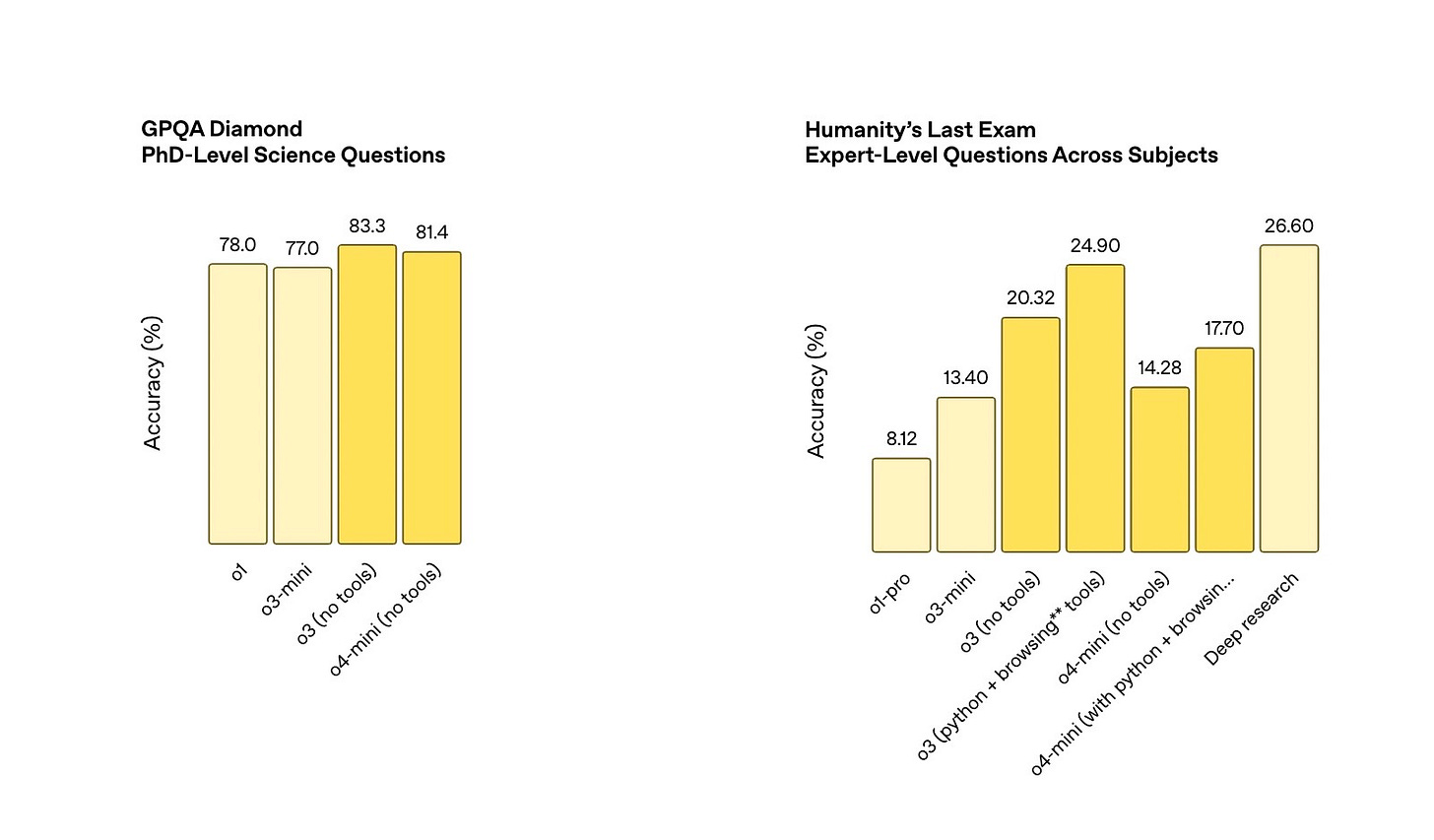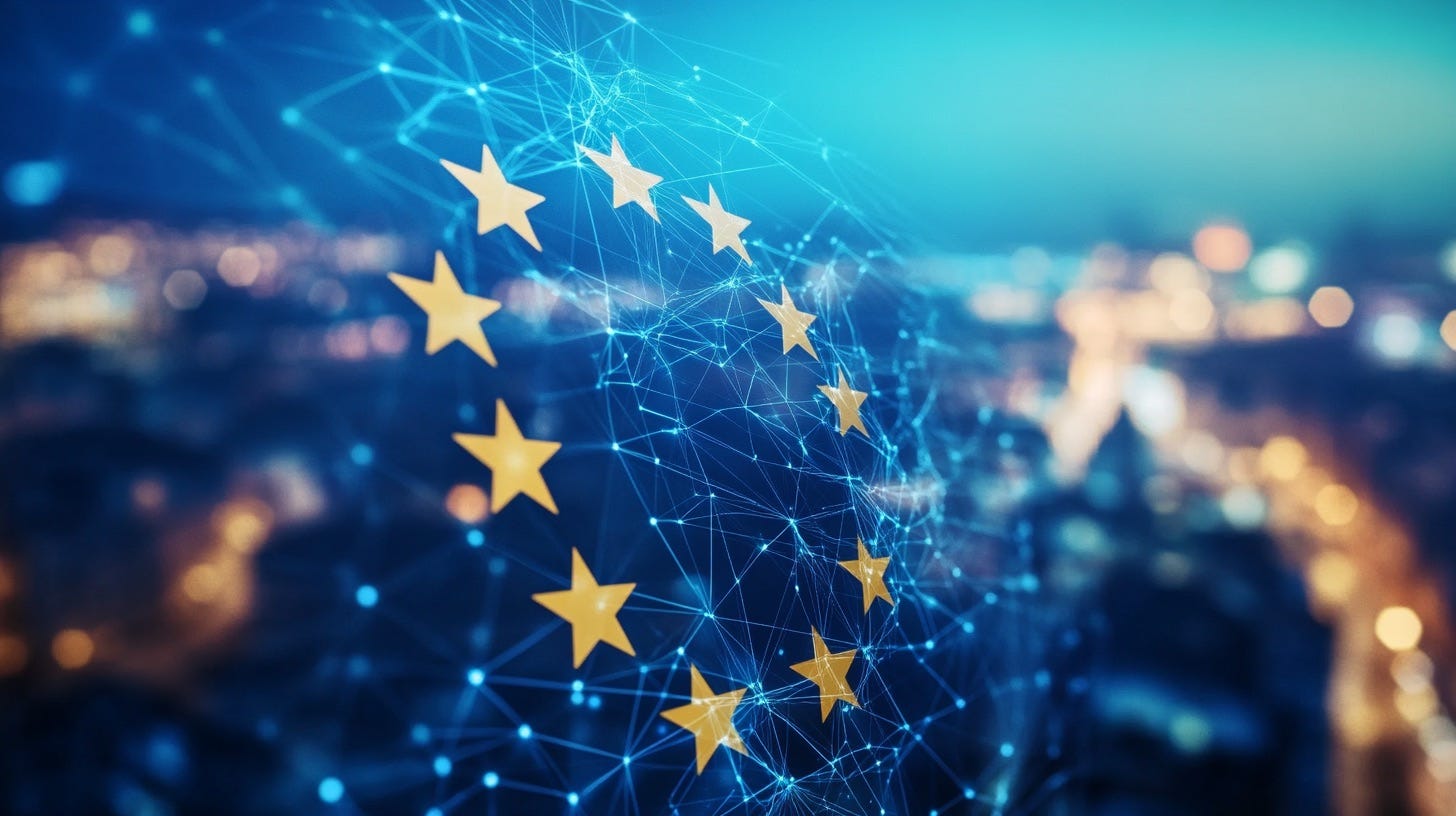One of those weeks
OpenAI has dominated the headlines this week, with not one but five new model releases, plus a new developer tool.
What to watch:
GPT-4.1 (in standard, mini, and nano sizes), the successor to GPT-4o with a million-token context window.
Interestingly, this model is being made available via the API but not ChatGPT, and it breaks Sam Altman's previous statement that the next GPT-series model would include reasoning.
o3 and o4-mini, two new multimodal reasoning models that have been trained for tool use and set new records on a variety of benchmarks.
And Codex CLI, an open-source coding agent that runs in the terminal (similar to Claude Code).
And yet:
I'd also be remiss if I didn't mention Google's continuing streak of launches - industry observers have commented that Google appears to be winning on every AI front. Just this week, we also saw:
Gemini 2.5 Flash, a faster and cheaper version of its highly-lauded Gemini 2.5 Pro model.
Veo 2, previously in early access, is now available for Gemini Advanced subscribers.
And DolphinGemma, a model that - believe it or not - is aimed at learning how dolphins communicate.
Elsewhere in frontier models:
Anthropic's Claude adds Research capabilities for searching the web and internal documents, now in beta for paid plans.
The company is also preparing to launch a limited voice mode feature for Claude as early as this month.
And Cohere launched Embed 4, an enterprise AI search engine with 128K context length and enhanced multimodal capabilities for complex documents.
Elsewhere in OpenAI:
OpenAI and SoftBank are exploring potential UK investments for their Stargate project as part of international expansion plans.
OpenAI is reportedly discussing acquiring AI coding tool Windsurf for approximately $3 billion.
The company is rolling out an image library feature in ChatGPT across all subscription tiers.
OpenAI is reportedly developing a social network, potentially based on ChatGPT’s image generation capabilities.
And organizations may soon need to complete ID verification to access OpenAI's advanced AI models.
Meta wants European data
Meta has decided to resume AI training using public content from European users, expanding its AI data collection in the EU despite previous privacy concerns.
The big picture:
The company is threading a careful needle between AI advancement and EU privacy laws, specifically limiting collection to public posts from adult users and excluding private messages.
Overall, the EU continues to be somewhat at odds with AI companies - many AI products and features are simply unavailable in the EU, while each week brings new regulatory skirmishes, like Ireland's investigation into xAI's use of personal data.
The EU continues to be one of the only governing blocs with robust AI regulation, though lawmakers have already expressed some concerns over whether the AI Act goes too far in threatening investment and innovation.
Elsewhere in the FAANG free-for-all:
Google offers its AI Premium plan free to US college students through spring 2026, with signups open until June 2025.
Microsoft's new Copilot Studio tool enables AI agents to interact with websites and desktop apps while automatically adapting to changes.
Apple plans to implement an on-device analysis of user data compared to synthetic data to improve AI in upcoming OS betas.
And xAI is adding memory features to Grok, allowing the chatbot to remember past conversations for more personalized responses.
Elsewhere in AI anxiety:
Data annotation jobs that many Venezuelans relied on have become scarce and poorly paid due to the rise of generative AI.
Community colleges are battling fake bot students who enroll in online classes and submit AI-generated work to fraudulently obtain financial aid.
And cybersecurity researchers warn of "slopsquatting" attacks where threat actors create malicious packages using AI-generated names that resemble legitimate software libraries.
The invisible hand
Presidents Biden and Trump both signed Executive Orders calling for more AI adoption across the federal government, but plenty of departments are adopting new AI tools without federal prodding.
Between the lines:
While the military has long relied on predictive AI like computer vision, the Pentagon has tasked Vannevar Labs with using LLMs (both existing and proprietary) to process terabytes of daily intelligence data in dozens of languages.
At the Department of Energy, Argonne National Laboratory has internally developed PRO-AID, an AI tool that combines generative AI and automated reasoning to monitor nuclear plants and assist operators (nearly a third of US nuclear plants are looking to power AI data centers).
And CBP has expanded its AI-powered social media monitoring capabilities through tools from Fivecast and Dataminr, which can rapidly identify "people of interest" by analyzing public social media content.
Elsewhere in AI geopolitics:
The US House has launched a probe into Nvidia to investigate whether the company knowingly provided AI technology to DeepSeek in violation of US regulations.
India's government is reviewing 67 funding bids from startups and research labs to develop domestic AI models and catch up in the global AI race.
NATO is set to adopt Palantir's Maven Smart System, an AI platform that enables a small team of soldiers to process battlefield data that previously required hundreds of analysts.
And Nvidia's US manufacturing pledge of $500B follows a common pattern of companies seeking to appease President Trump while providing few specifics about domestic AI production plans.
Things happen
The Wikimedia Foundation partners with Kaggle to release structured Wikipedia content for AI training. Docusign unveils AI contract agents that can analyze agreements without human intervention. Perplexity in talks with Samsung to integrate its AI assistant on devices. Notion releases lightweight Gmail client to help organize and draft emails. Google VP discusses the future of AI search and its impact on ad revenue. Hugging Face acquires maker of humanoid robot Reachy 2. ByteDance leverages data from 1B users as foundation for AI business. Nvidia starts making Blackwell chips at TSMC's Phoenix plant. Google DeepMind posts job listing for post-AGI researcher. Former YC president launches $100K AI safety fund. Ilya Sutskever's Safe Superintelligence raises $2B at $32B valuation. AI-generated music hits 18% of Deezer uploads. A look at why bigger isn't always better for large context LLMs. AI could help doctors improve their bedside manner. Ex-OpenAI employees support Musk in lawsuit. Benchmarking AI reasoning models gets more expensive. Police deploy AI-powered undercover bot to monitor college protesters. LAPD obtains crime footage from Waymo vehicle. Inside the world of AI disaster exploitation. Testing the AI that calls your elderly parents. AI as normal technology. The weird world of AI poison pills and adversarial noise. Microsoft develops hyper-efficient AI model for CPUs. The peanut butter and jelly problem in AI coding. AI is turning us into glue. Hinge launches AI matchmaker. Netflix tests OpenAI-powered search for mood-based recommendations.






